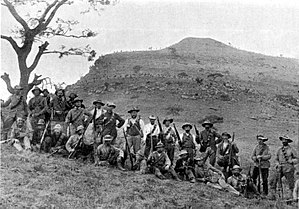South Africa 1900–01
| Second Boer War | |||||||||
|---|---|---|---|---|---|---|---|---|---|
| Part of the Boer Wars | |||||||||
 Boer militiamen at Spionkop |
|||||||||
|
|||||||||
| Belligerents | |||||||||
|
|||||||||
| Commanders and leaders | |||||||||
|
|
|
||||||||
| Strength | |||||||||
|
British Regulars: 347,000 Colonial Forces: 103,000–153,000 |
25,000 Transvaal and 15,000 Free State Boers at the start of the war, plus foreign volunteers and Cape Boers | ||||||||
| Casualties and losses | |||||||||
|
Military casualties: 22,092 dead 934 missing 22,828 wounded |
Military casualties: |
||||||||
British Empire victory
![]() Orange Free State
Orange Free State![]() South African Republic
South African Republic![]() Cape Boers
Cape Boers
Military casualties:
6,189 dead
24,000 Boer prisoners sent overseas;
21,256 bitter-enders surrendered at the end of the war;
The Second Boer War (Dutch: Tweede Boerenoorlog, Afrikaans: Tweede Vryheidsoorlog, "Second Freedom War"), usually known as the Boer War and also at the time as the South African War, started on 11 October 1899 and ended on 31 May 1902. Great Britain defeated two Boer states in South Africa: the South African Republic (Republic of Transvaal) and the Orange Free State. Britain was aided by its Cape Colony, Colony of Natal and some native African allies. The British war effort was further supported by volunteers from the British Empire, including Southern Africa, the Australian colonies, Canada, India, and New Zealand. All other nations were neutral, but public opinion in them was largely hostile to Britain. Inside Britain and its Empire there also was significant opposition to the Second Boer War.
...
Wikipedia
